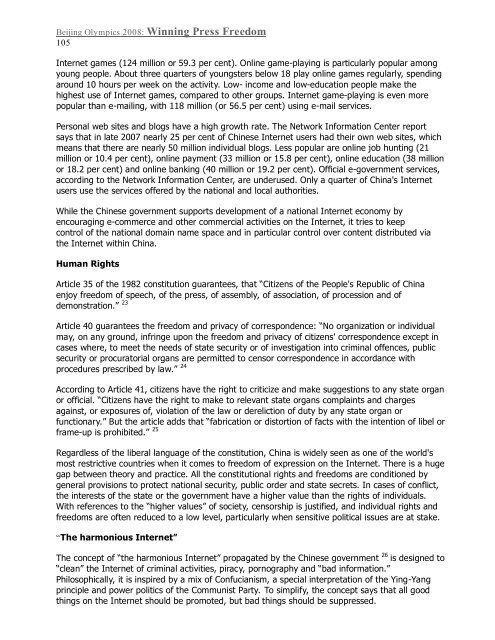Beijing Olympics 2008: Winning Press Freedom - World Press ...
Beijing Olympics 2008: Winning Press Freedom - World Press ...
Beijing Olympics 2008: Winning Press Freedom - World Press ...
You also want an ePaper? Increase the reach of your titles
YUMPU automatically turns print PDFs into web optimized ePapers that Google loves.
<strong>Beijing</strong> <strong>Olympics</strong> <strong>2008</strong>: <strong>Winning</strong> <strong>Press</strong> <strong>Freedom</strong><br />
105<br />
Internet games (124 million or 59.3 per cent). Online game-playing is particularly popular among<br />
young people. About three quarters of youngsters below 18 play online games regularly, spending<br />
around 10 hours per week on the activity. Low- income and low-education people make the<br />
highest use of Internet games, compared to other groups. Internet game-playing is even more<br />
popular than e-mailing, with 118 million (or 56.5 per cent) using e-mail services.<br />
Personal web sites and blogs have a high growth rate. The Network Information Center report<br />
says that in late 2007 nearly 25 per cent of Chinese Internet users had their own web sites, which<br />
means that there are nearly 50 million individual blogs. Less popular are online job hunting (21<br />
million or 10.4 per cent), online payment (33 million or 15.8 per cent), online education (38 million<br />
or 18.2 per cent) and online banking (40 million or 19.2 per cent). Official e-government services,<br />
according to the Network Information Center, are underused. Only a quarter of China's Internet<br />
users use the services offered by the national and local authorities.<br />
While the Chinese government supports development of a national Internet economy by<br />
encouraging e-commerce and other commercial activities on the Internet, it tries to keep<br />
control of the national domain name space and in particular control over content distributed via<br />
the Internet within China.<br />
Human Rights<br />
Article 35 of the 1982 constitution guarantees, that “Citizens of the People's Republic of China<br />
enjoy freedom of speech, of the press, of assembly, of association, of procession and of<br />
demonstration.” 23<br />
Article 40 guarantees the freedom and privacy of correspondence: “No organization or individual<br />
may, on any ground, infringe upon the freedom and privacy of citizens' correspondence except in<br />
cases where, to meet the needs of state security or of investigation into criminal offences, public<br />
security or procuratorial organs are permitted to censor correspondence in accordance with<br />
procedures prescribed by law.” 24<br />
According to Article 41, citizens have the right to criticize and make suggestions to any state organ<br />
or official. “Citizens have the right to make to relevant state organs complaints and charges<br />
against, or exposures of, violation of the law or dereliction of duty by any state organ or<br />
functionary.” But the article adds that “fabrication or distortion of facts with the intention of libel or<br />
frame-up is prohibited.” 25<br />
Regardless of the liberal language of the constitution, China is widely seen as one of the world's<br />
most restrictive countries when it comes to freedom of expression on the Internet. There is a huge<br />
gap between theory and practice. All the constitutional rights and freedoms are conditioned by<br />
general provisions to protect national security, public order and state secrets. In cases of conflict,<br />
the interests of the state or the government have a higher value than the rights of individuals.<br />
With references to the “higher values” of society, censorship is justified, and individual rights and<br />
freedoms are often reduced to a low level, particularly when sensitive political issues are at stake.<br />
“The harmonious Internet”<br />
The concept of “the harmonious Internet” propagated by the Chinese government 26 is designed to<br />
“clean” the Internet of criminal activities, piracy, pornography and “bad information.”<br />
Philosophically, it is inspired by a mix of Confucianism, a special interpretation of the Ying-Yang<br />
principle and power politics of the Communist Party. To simplify, the concept says that all good<br />
things on the Internet should be promoted, but bad things should be suppressed.





